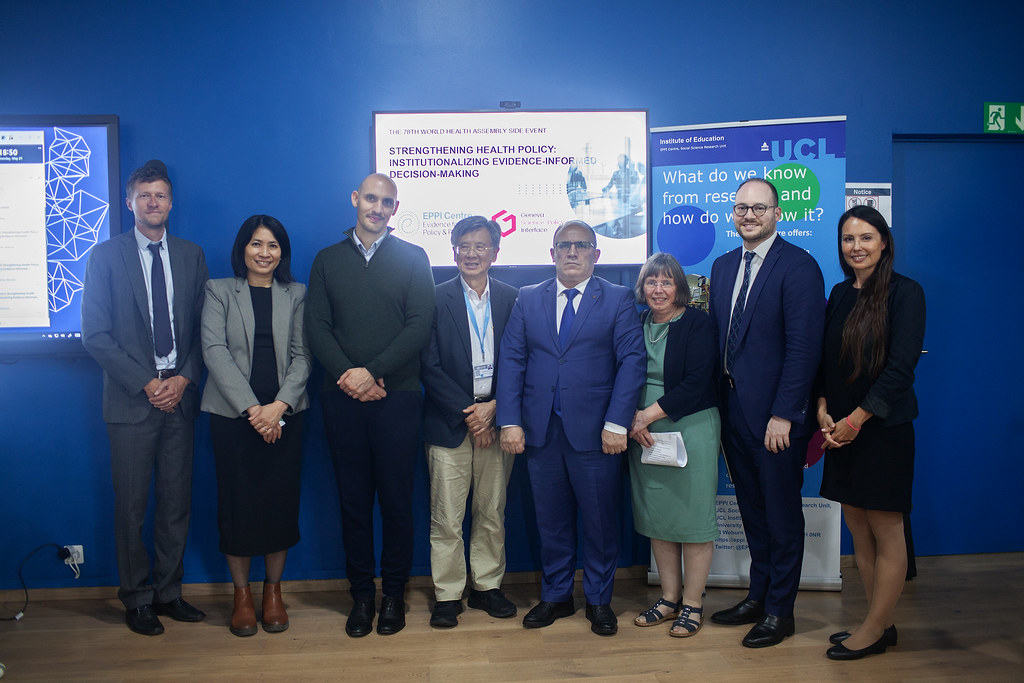A collaboration supported by the Geneva Science-Policy Interface’s Impact Collaboration Programme (ICP) and led by the WHO’s Evidence-Informed Policy Network (EVIPNet) and UCL EPP-Centre, Social Science Research Unit has furthered the integration of evidence into health policymaking. At a public session held alongside the 78th World Health Assembly, panel speakers explored how the WHO Evidence-Informed Decision-Making (EIDM) Institutionalization Checklist can serve not only as a diagnostic tool but also as a catalyst for systemic change in different countries- Tajikistan, Trinidad and Tobago, Thailand, and South Africa
The WHO Checklist is designed to help organizations and countries assess and strengthen the use of evidence in health and social policy. It supports the identification of gaps, the improvement of governance structures, and the fostering of coordination between diverse institutions. More than a technical instrument, the WHO Checklist facilitates collective reflection and collaboration across ministries, researchers, civil society, and donors.
The political nature of evidence use
The event brought together Member States, WHO representatives, researchers, community groups, international organisations, and funders to share experience of countries’ capacities to routinely use evidence in decision-making. A key theme was that access to evidence alone does not guarantee its use. Uptake is shaped by institutional culture, leadership, political incentives, and the quality of relationships across sectors. As expressed by country representatives at the event, even robust scientific findings may be sidelined if they are not timely, relevant, or trusted by decision-makers.
The WHO Checklist is particularly valuable in helping actors understand how decisions are made, by whom, and on what basis. The process of applying the WHO Checklist itself fosters internal coherence, builds trust, and generates momentum for long-term reform.
Bridging research and policy
Panel speakers emphasised the need to move beyond traditional models of evidence production. Standalone studies often do not provide the contextual relevance or synthesis policymakers require.
Co-produced knowledge—developed in close partnership between researchers and decision-makers—was highlighted as more likely to be effective for supporting uptake. This is an area where the expertise of UCL-EPPI-Centre and its collaboration with WHO, collaboratively working with local team researchers, and policy-makers in those countries were key to the success of the project.
In this landscape, knowledge brokers play a vital role. Independent or based within policymaking or research institutions, these individuals or organisations help translate evidence, bridge institutional divides, and ensure that research findings are communicated in formats suited to policymaking. Particularly during times of financial constraint or political uncertainty, they help keep evidence visible, relevant, and accessible.
Broadening the definition of evidence
Another important takeaway was the need to recognise multiple forms of knowledge in policy processes. While scientific evidence remains central, the experiences of frontline workers, communities, and citizens are equally important in shaping fair and effective health policies. Acknowledging these sources enhances accountability and contributes to more inclusive governance, as highlighted by a science-policy interface practitioner working to institutionalize evidence use in global health governance.
From checklist to change
The WHO Checklist addresses six domains essential to embedding evidence use in policymaking routines. It acts both as a mirror—enabling countries to understand their current systems—and as a springboard for action, bringing together institutions that may not typically collaborate and helping align their efforts over time.
This initiative is part of the Geneva Science-Policy Interface’s Impact Collaboration Programme (ICP), which supports partnerships tackling complex policy challenges through the co-production and application of evidence. By fostering institutional dialogue and shared ownership, this collaboration is laying the groundwork for more robust, transparent, and responsive public health systems.
Check the photo gallery of the event: https://flic.kr/s/aHBqjCk4wS
Check the project page: https://www.gspi.ch/collaboration-projects/supporting-the-routine-use-of-evidence-during-the-health-policy-making-process-a-pilot-project-of-world-health-organization-checklist-icp-2023
Contacts
Tanja Kuchenmüller, Unit Head, Evidence to Policy and Impact, Science Division at the WHO: kuchenmullert@who.int
Mukdarut Bangpan, Professor, the Evidence for Policy and Practice Information and Coordinating Centre (EPPI-Centre), Director of Social Science Research Unit, UCL: m.bangpan@ucl.ac.uk



.png)

